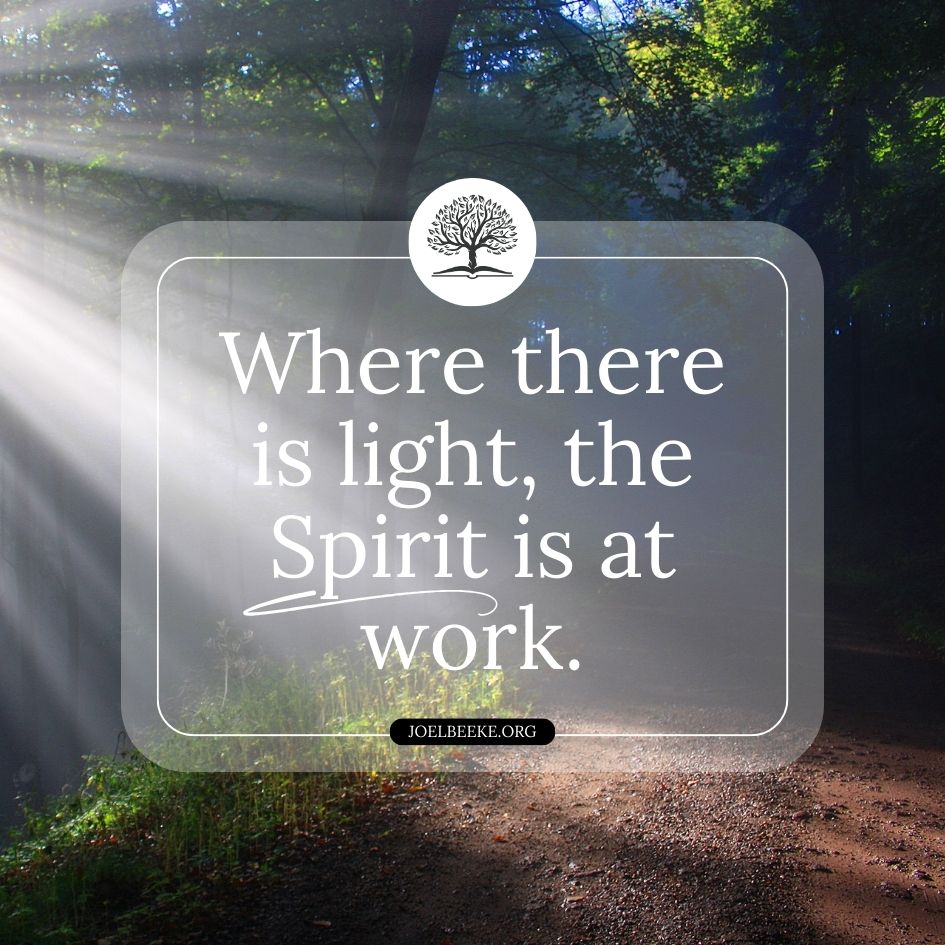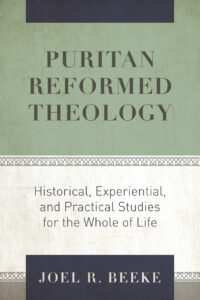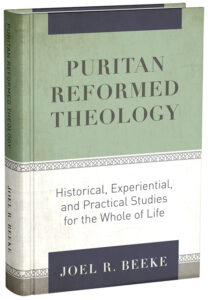
A superficial reading of the New Testament might lead some to conclude that the presence of the Spirit in the church and in the world was something new. The same mistake is often made regarding what Christ calls “the new covenant in my blood.” It is easy to separate the New Testament from the Old and conclude that a great gulf exists between the two. Some Christians speak of Pentecost as “the birthday of the church,” as if there were no visible church in the world prior to that time. Worse yet, some speak of the Jewish church of the Old Testament as something radically different from the Christian church of the New, as though each had nothing to do with the other.
That is simply not so, for the person and work of the Spirit are introduced to us already at the dawn of time. The earth was shrouded in darkness and a flood of great waters, but Moses tells us, in Genesis 1:2, “The Spirit of God moved upon the face of the waters.” The verb “moved upon” can be translated as “hovering” in the sense of shaking or fluttering, like a bird hovering over its nest. In fact, Deuteronomy 32:10–11 uses the same verb when it speaks of an eagle hovering over its young, tending to their every need. In His capacity as “Lord and Giver of Life,” the Spirit was fully present and active at the beginning to enact the astonishing results demanded by the various creative “fiats” of God. Psalm 104:30 says, “Thou sendest forth thy spirit, they are created: and thou renewest the face of the earth.” In particular, the Spirit filled the earth, the seas, and the dry land with all kinds of living things. We may thus speak of the biosphere, or realm of life and living things that cover the earth, as the great creation of God the Holy Spirit (cf. Job 26:13).
In our creation, the Spirit was also present as the “Breath of Life,” or the breath of God that proceeded from the Father and the Son. When breathed into the nostrils of the divinely-sculpted but lifeless form of man, the Spirit transformed a creature of dust and earth into a living being (Gen. 2:7). Job 33:4 says, “The spirit of God hath made me, and the breath of the Almighty hath given me life.” Thus we owe our life and the life of every other living thing as much to the power and creativity of the Holy Spirit as we do to the hand of our Maker and Father in heaven.
Man is a created being and therefore has no life in himself. He cannot beget himself, nor can he generate or sustain his development to maturity. He cannot keep himself alive or deliver himself from the power of death. For all this we must depend on the grace of God and, in particular, on the work of the Holy Spirit. When God withholds His grace, we decline and die; when He sends forth His life-giving Spirit, we and all living things are quickened again and flourish by the same power that gave us life at the beginning (Ps. 104:30).
So wherever there is life, the Holy Spirit is at work. David lived in a world pervaded by the omnipotent presence of the Holy Spirit, for he says in Psalm 139:7, “Whither shall I go from thy Spirit? Or whither shall I flee from thy presence?” But the Spirit is more than power. As a person, He possesses the intelligence and the wisdom of God. As the source of “all holy desires, all good counsels, and all just works,” He is at work in the minds and hearts of human beings everywhere. All valid insights into the nature of things, philosophical or scientific; all skills, whether manual, mechanical, or creative; all discoveries, inventions, or works of art; and everything that blesses the life of mankind reveal the presence and work of the Holy Spirit throughout history. The Spirit distributes gifts of statesmanship and craftsmanship that extend beyond man’s natural capacity. Consider the remarkable leadership skills He imparted to Joseph, which Pharaoh recognized (Gen. 41:38), and to Daniel, which the kings of Babylon acknowledged (Dan. 4:8–9, 5:11–14). Exodus 31:3–5 tells us that the Holy Spirit filled Bezaleel with knowledge and wisdom to do “all manner of workmanship” for constructing and furnishing the tabernacle. The Holy Spirit also provided some of the early kings of Israel with special capabilities (1 Sam. 16:13), spoke directly to prophets (Ezek. 2:2), and inspired the Old Testament Scriptures through a divine out-breathing and Spirit-bearing influence (2 Tim. 3:16–17; 2 Peter 1:21). All these things are gifts of God, which are distributed among us by the work of the Holy Spirit. Without His light, human beings would produce anarchy and self-destruct and be condemned to utter darkness.
As the Spirit of holiness, the Spirit also labors in the world as the moral agent of God, “striving with man” to sustain whatever remains of the light of conscience, to restrain the destructive excesses of human depravity, and to mitigate the effects of the evil that people commit against one another. When we are overwhelmed by reports of the terrible things that humans do, we should consider how much worse it would be without the gracious work of the Spirit. His absence did not bode well for the people who lived in the world before the flood, whom God warned, “My spirit shall not always strive with man” (Gen. 6:3). Withdrawing His Spirit from a man, a church, a nation, or the world is a sure sign of God’s hot displeasure.
It follows, then, that the Spirit so values the world that He does much more than create political entities and provide Israel with a theocracy. The Spirit also works progressively and cumulatively through historical redemptive revelation, both corporately and individually. Sinclair Ferguson writes, “Isaiah 63:7–14 clarifies this with its reflections on the Exodus, the great paradigmatic redemptive act of the Old Testament. (1) The Spirit is associated with the activity of Moses in working miracles (see Ex. 8:19)…. He is the divine witness-bearer to the redemptive activity of God (Isa. 63:11–12). (2) The Spirit leads and guides the people into the benediction of covenant fulfillment (Isa. 63:14)…. (3) The Spirit is the executive of the Exodus-redemption wrought by God the Saviour (Isa. 63:8).”2
The Spirit has an essential role in the redemptive life of each individual believer. Knowing that true faith is worked in our hearts by the Holy Spirit who uses the Word of God as His chosen instrument, we can say that wherever prophecy and revelation exist and wherever the Word of God is received by faith, the Holy Spirit is at work. The fruit of the Spirit delineated in Galatians 5:22–23 was already manifest in Old Testament believers. Whether it be Adam, Noah, Abraham, Moses, David, the heroes of faith, the martyrs of God, His servants, the prophets, or the believing remnant of the house of Israel, the work of the Holy Spirit was evident in what they believed and how they lived. David said the Holy Spirit was the treasure of his life. Fearing that he might lose this treasure, he earnestly prayed, “Take not thy holy spirit from me” (Ps. 51:11).
Where there is life, the Spirit is at work. Where there is light, the Spirit is at work. Wherever the might of human sin and evil is limited by divine providence, the Spirit strives with men. Where there is faith, the Spirit is at work in the hearts of men, fulfilling both individually and corporately a variety of goals in redemptive history that will lead to His fuller ministry in the Lord Jesus Christ and the present New Testament age.
Excerpt from
Puritan Reformed Theology: Historical, Experiential, and Practical Studies for the Whole of Life
By Joel R. Beeke










